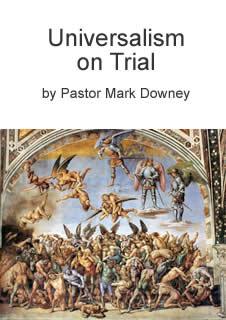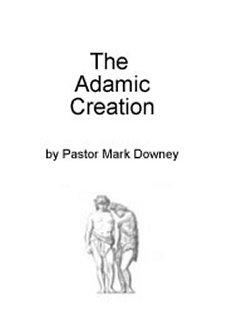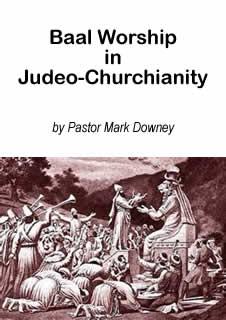by Pastor Mark Downey
It is assumed that just because the words "Satan" and "Devil" are incorporated into the Masoretic text, that proves the existence of a literal supernatural being. However, if we probe a little deeper into Scripture to see who or what is the principle of temptation in the case of both Jesus and Eve, we will discover something that cannot be easily dismissed or passed off as mere coincidence. To understand what tempts man, we must search scripture for an answer (to see whether it is a personification of evil called "Satan" or something else). I believe the answer is found in I John 2:16 which says, "For all that is in the world, the lust of the flesh, the lust of the eyes, and the pride of life, is not of the Father, but is of the world." The "Satan" or "Devil" is not mentioned as having anything to do with "All that is in the world." What this tells us is that all temptations of evil are of this terrestrial world.
How does this relate to the three accounts of the Temptation of Christ? It must have been an important lesson to be included in the three gospels of Matthew, Mark and Luke. In each book, Jesus is tempted in three situations which (ironically) correspond to the three elements of 'all that is in the world'.
1. "And when the tempter came to Him, he said, If thou be the Son of God, command these stones be made bread" Mt. 4:3. This corresponds to the lust of the flesh.
2. "Again the devil [small 'd', thus a noun] taketh Him up into an exceeding high mountain, and showeth Him all the kingdoms of the world, and the glory of them" Mt. 4:8. This corresponds to the lust of the eyes. If we are to understand this exceedingly high mountain to be literal, then we are stuck with the impossibility of literally seeing all the kingdoms of the world by virtue of a limited horizon. Even if one were on top of Mt. Everest, one would not be able to see all the kingdoms of the world. This indicates that the narrative is engaged in figures of speech.
3. "If thou be the Son of God, cast thyself down" Mt. 4:6. This corresponds to the pride of life.
These three elements are the only things that tempted Christ. The devil in this case, as it was with Eve and ourselves today, is the adversarial mentality to go against God. We can overcome adverse thinking as did Jesus Christ. Let's look at who or what tempted Eve.
If Adam and Eve had remained obedient to God's command, death would not have entered the world. There's some pretty heavy symbolism going on in the Garden of Eden. Adam was formed exclusively by God and had no flesh mother; and because of that, God's spirit dominated his flesh so that he wasn't carnally minded. Eve on the other hand was made by God out of Adam's flesh and thus the weaker vessel. Adam was made from the dust of the ground. Dust cannot be tempted and neither can God's Spirit (James 1:13). This may explain why there had to be a weak link for Eve to be tempted. If this wasn't God's purpose, He would have created Eve out of the dust also. As such, neither could have been tempted in the flesh.
The three temptations of 'all that is in the world' (I John 2:16) were also laid upon Jesus' flesh (Luke 4:1-13). Christ had a heavenly Father (creator) and also a flesh mother (Mary). The difference between these two temptations (Jesus' and Eve's) is that Christ overcame the flesh. We know God's Spirit cannot be tempted without the introduction of the flesh. After 40 days of fasting in the wilderness, it was Jesus' own hunger, visualization and potential ambition that entered His mental state or condition.
The "tree of knowledge" represents God's Law in spiritual form (Romans 7:14). Partaking of its fruit, as Adam and Eve were warned and found out brings on death. It wasn't the actual fruit that inflicted death, but rather their disobedience to what the Lord had commanded. So, in the symbolism of a tree, embodied three manifestations of all that is in the world. That is: the lust of the flesh, the lust of the eyes and the pride of life (I John 2:16). "Satan" is not included in "all that is in the world". When we investigate Eve's infatuation by way of a stimulant i.e the serpent, we find that all three parts of our worldly enticements were presented in the temptation.
1. The lust of the flesh was accomplished in that "The tree was good for food."
2. The lust of the eyes was fulfilled in that "It was pleasant to the eyes."
3. And the pride of life was achieved in Eve's belief that it was "A tree to be desired to make one wise" (Gen. 3:6).
Perhaps, conceptually, the word satan has been so misinterpreted to align itself with pagan mythology rather than with the Word of God, that it is incomprehensible to those who have been inculcated with years of superstitious teachings and 'doctrines of devils' to believe in the simplicity of Christ. Let me give you a comparative example of how the Bible says the same thing in two different ways. "For this purpose the Son of God was manifested, that He might destroy the works of the devil" I John 3:8. And then we read the same premise just three verses prior, "He was manifested to take away our sins." It shouldn't be too hard to comprehend that it is our sin nature, which the Bible says is the only thing in the world (that should be of concern) and it is: the lust of the flesh, lust of the eyes and the pride of life. It is these three things that tempted both Eve and Jesus, not a vicarious supernatural agent in lieu of God. We are further told in James 1:14 that "every man is tempted, when he is drawn away of his own lust, and enticed." Again, no mention of any supernatural being. That should give any casual reader pause for reflection.

















